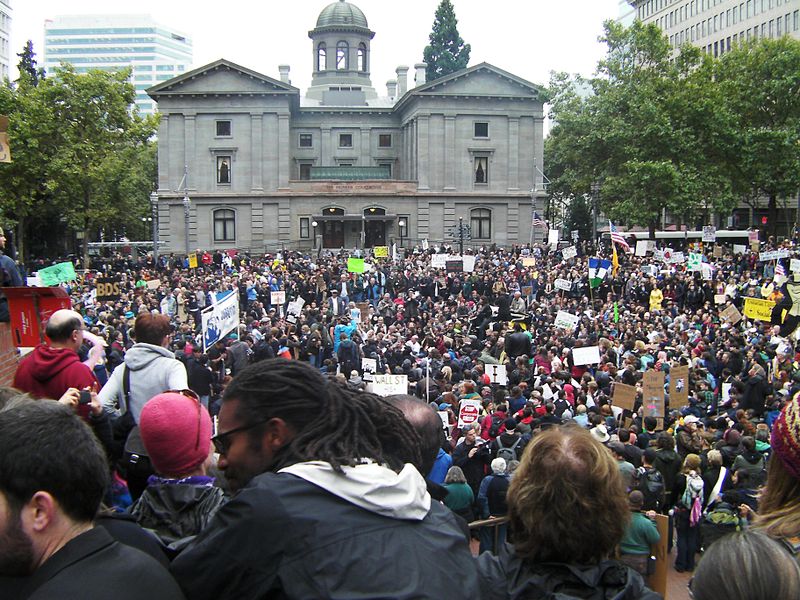Research and the Researcher
A strange thing happened to me, and indeed the world, only a few short months ago when a group of people decided to set up camp and literally occupy Wall Street to protest economic inequality the United States. Never before an activist by nature, I found myself becoming more educated in the statistics and issues and started following the protests. Spending many a late night witnessing the raids on camps via Livestream, I was shocked to discover that our own cities and police forces would treat peaceful protestors in such a way. Therefore, when Portland finally formed an occupation of its own, I was immediately interested in these brave souls and their large campsite in the heart of the city.
While this movement is perhaps the most significant protest movement since the ‘60s, the occupations themselves are something that one rarely sees in the United States – a place where informal squatter settlements are illegal and almost impossible to create in the highly regulated urban environments we maintain - as we have seen recently with the dismantling of these camps across the country. As an anthropologist by trade and currently specializing in public space as part of my masters degree in urban studies, the urban occupations in downtown Portland were the perfect intersection of the two: several hundred people forming a temporary informally planned settlement within an urban park with no top-down processes determining socio-spatial systems. The curiosity was overwhelming.
In a (personally) record-breaking time span of three hours I decided to rush headlong into a research project proposal in order to investigate who the occupiers were, how the spatial orientation of the camp was organized, and what sort of social behavior came out of a situation where hundreds of people were living virtually in public and forced to solve problems in unique and challenging ways. What I found in the process of this three-week long ethnography was a virtual microcosm of society 500-600 people strong packed into two city blocks at Chapman and Lownsdale Square parks. While there I was able to become involved volunteering at the Information Tent, the hub of the camps where people would drop off donations, ask questions, and just generally get information. The interaction with the occupiers and non-occupiers alike created instant bonds of what the protestors call solidarity, as I blended the participation in the movement with the research and academic perspective.
This blend of personal involvement and research raises some interesting questions: just what is the real relationship between the research and the researcher? In many cases it involves the researcher not only choosing the research they conduct for whatever reason, but also some sort of personal involvement in the people, place, or in this case, politics along with observations or analysis. Interacting with people, as a person, is a very strong and significant activity. Emotions at times of crisis or celebration create a connection with the people you spend time with, especially significant in a situation where a village of people under duress is forced to befriend one another and resolve conflicts at the same time.
In this case, my personal feelings are very much in favor of the movement itself, which led me to conduct this research and also become involved. Had I not felt the way I did, I may not have volunteered and assisted in the progress of the camp. However, if I had only done observational research, I would have never gotten the kinds of data that I gathered by joining in the communal meals, drama, or clustered neighborhoods formed in the “private space” of the camps. I would probably not have fully understood the perspective of those fighting to keep their newfound homes and community, or the frustration of those whose lives have been filled with struggle and grief. I also wouldn’t understand the anger behind the protestors, all the while remaining peaceful in the face of what could only be explained as intimidating, even oppressive, force.
If I were to remove myself completely from the equation, observe objectively and only from a distance, my stories and research would be completely different. I believe that they would be less accurate and more of a historical narrative than an in-depth investigation into the people and processes. While it is important to remain objective to an extent and attempt to analyze without bias, the fact remains that I would not have conducted the research had I not been interested in Occupy Portland to begin with. In my opinion, I think this is true for most of us as well.
I am passionate about giving people a public place to relax, interact with friends, eat lunch, or even protest. I think that ultimately my motivation is to improve the places that I would like to enjoy as well, which leads to my specialization and focus on the public sphere. I would never be able to spend so much time actively pursuing something I did not feel strongly about. The research and the researcher are always tied and can never be truly separated, whether it’s because of the decision to research the topic or the level of personal involvement, we all have something to add as people to our projects. If we can better understand this and acknowledge it, I believe it can better the scope and content of academia and potentially even allow the research to relate to the non-researchers, too.
The full project page can be found here.
